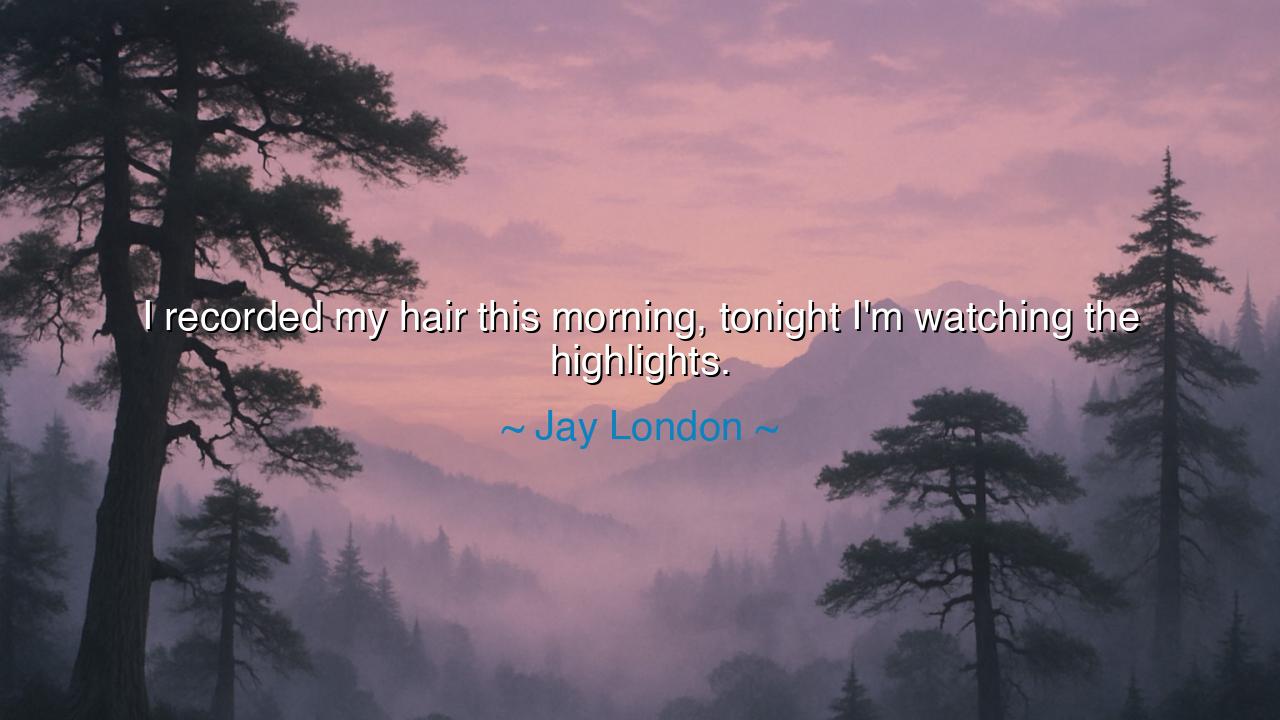
I recorded my hair this morning, tonight I'm watching the






“I recorded my hair this morning, tonight I’m watching the highlights.” — Jay London
At first hearing, this line by Jay London, the humble sage of absurdist wit, seems to be no more than a light jest — a clever play upon words, a simple twist of language meant to elicit laughter. Yet, as with much of London’s comedy, there lies beneath the humor a subtle whisper of truth about vanity, simplicity, and self-awareness. His humor, soft-spoken and disarming, carries the tone of the fool-philosopher — that archetype from ancient days who cloaks wisdom in laughter so that truth may reach the heart through joy. The quote, when heard with the ear of contemplation, reveals not only a pun, but a reflection on how we humans delight in our own reflection, how we chase the highlights — both literal and metaphorical — of our lives.
To “record one’s hair” is, of course, a jest, for hair is no music to capture and replay. Yet in the comedy of this impossibility lies a deeper meaning: the human desire to preserve oneself, to hold on to moments of beauty, to replay one’s own image in the theater of memory. When London speaks of watching the “highlights,” he mocks our modern obsession with appearance, fame, and the endless pursuit of self-importance. He turns a mirror toward the audience and says, gently but unmistakably: we are all watching ourselves too closely. The line becomes a fable about how easily we are entertained by our own reflection, forgetting that true joy lies not in vanity, but in the living, breathing act of existence itself.
The ancients, too, knew this folly. In the myth of Narcissus, the beautiful youth who gazed upon his own image until it consumed him, we find the eternal warning against self-absorption. Narcissus did not die of vanity alone — he died of separation from the world around him. He could not turn from the mirror to see the sky, the earth, the living souls beyond his own image. Jay London’s joke, spoken softly in the light of modern life, carries that same echo. When he says he will “watch the highlights,” he is speaking not just of hair, but of the curated moments of existence — the polished versions of ourselves we choose to see, while ignoring the depth of the full story. His humor becomes a parable of self-reflection taken too far, and a reminder to laugh at our own ridiculousness before it consumes us.
Yet there is tenderness in his humor — for London, unlike the harsh satirists, mocks without malice. His joke also honors the simple, human desire to take pride in oneself. To “watch the highlights” can also mean to celebrate one’s small victories, to find delight in the bright moments of the day. The ancients called this euthymia, the state of serene contentment that comes from knowing and accepting oneself. In this reading, London’s jest becomes a call to gratitude — to find joy even in the mundane, to smile at one’s reflection not in arrogance, but in lighthearted acceptance. For life, like hair, grows wild and uneven; and to laugh at it is to live wisely.
Consider, for example, the painter Leonardo da Vinci, whose notebooks are filled not only with sketches of genius but with pages of small curiosities — studies of hair, laughter, and light. Though he was a master of art and invention, he never ceased to marvel at the trivial. It is said that he once spent hours observing how a curl of hair catches the sun, how shadow moves along a cheek. In him, as in Jay London’s humor, we see the union of observation and wonder — the wisdom to find delight in what others dismiss as ordinary. For to laugh at oneself, as London teaches, is the mark of a soul free from the prison of pride.
The origin of this quote lies in London’s career as a stand-up comedian known for his self-deprecating simplicity. His appearance — wild hair, humble voice, uncertain posture — became his art. He made himself the subject of his own jest, not to belittle himself, but to reveal the comedy of being human. In this, he echoes the ancient jesters and court fools who could speak truths kings dared not utter. His humor is the laughter of awareness — the laughter of one who knows that life’s vanity, if met with kindness and wit, becomes not a curse, but a dance.
So, my child, take this teaching to heart: learn to laugh at yourself, gently and wisely. Do not be so consumed by your own “highlights” that you forget to live the whole story — the awkward beginnings, the humble mornings, the unrecorded hours that make life real. Let your laughter be your wisdom; let your humor be your humility. When you look into the mirror, smile — not because you see perfection, but because you see life itself, radiant and absurd.
For the one who can laugh at his own reflection, who can watch the “highlights” of his day and still love the bloopers, has already achieved what philosophers called enlightenment. And perhaps that was Jay London’s true joke — that wisdom, like comedy, begins the moment you stop pretending to be flawless and start rejoicing in the ridiculous beauty of being human.






AAdministratorAdministrator
Welcome, honored guests. Please leave a comment, we will respond soon